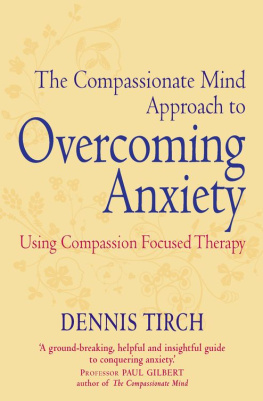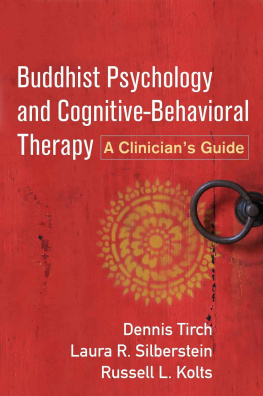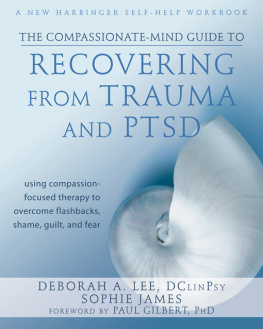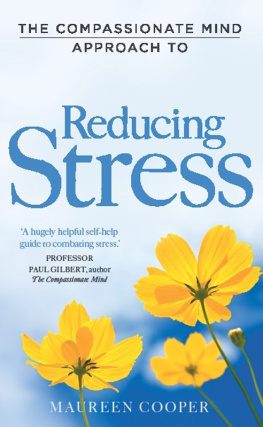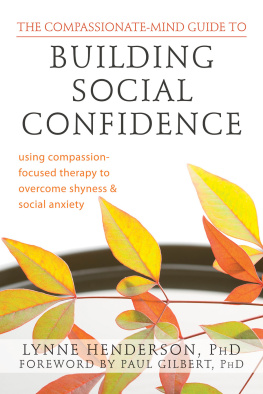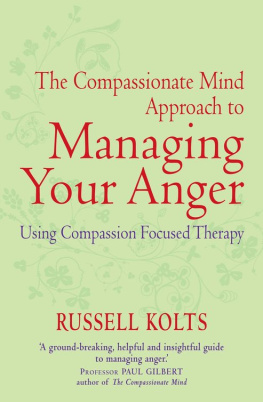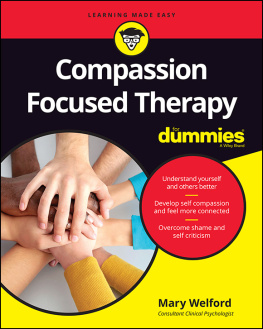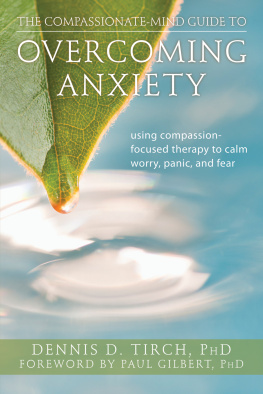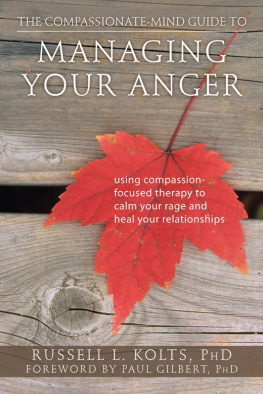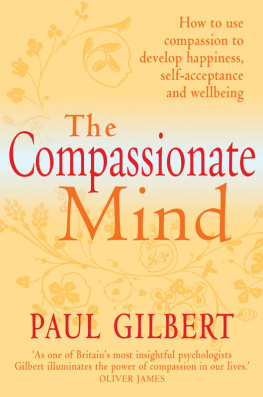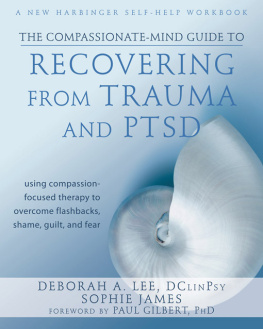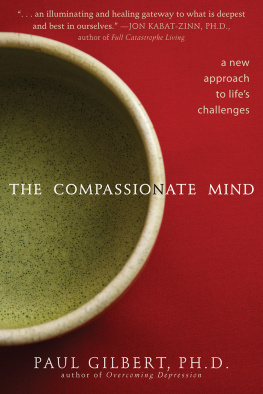Praise for The Compassionate Mind Approach to Overcoming Anxiety
Learning to treat yourself with kindness and compassion is like learning to place your feet firmly on the ground. If you are going to walk out of your struggle with anxiety, you need to regain your psychological footing, and this book will show you how. In a gentle, wise and step-by-step way, it will help you establish self-compassion as a habit of mind, and bring that healing quality to your thoughts and actions. Highly recommended.
Steven C. Hayes, author of Get Out of Your Mind and Into Your Life
Tirch writes with warmth and wisdom as if he is speaking directly to you. He shows how compassion, mindfulness and facing the difficulties of anxiety can bring personal growth. Filled with specific and powerful techniques, readers will find a new path to follow with a brilliant and compassionate guide. I highly recommend this book for all who suffer from anxiety.
Robert L. Leahy, Ph.D., author of The Worry Cure; Director, The American Institute for Cognitive Therapy; Clinical Professor of Psychology, Weill-Cornell University Medical College
Easy to read, grounded in solid research and filled with useful exercises, this book is a godsend for those who suffer from anxiety.
Kristin Neff, PhD, author of Self-Compassion; Associate Professor, University of Texas at Austin
A superb introduction to a revolutionary new way of dealing with anxiety. The reader is led on a compelling exploration of how the anxious mind works, followed by masterful exercises that tap our innate capacity for comfort and healing self-compassion. Seamlessly integrating important research and extensive clinical experience, the author speaks through the pages with the wise, gentle voice of experience. Go ahead try it and see what happens!
Christopher K. Germer, PhD, Clinical Instructor, Harvard Medical School; author of The Mindful Path to Self-Compassion; Faculty, Institute for Meditation and Psychotherapy
Cognitive Behaviour Therapy (CBT) has led the way in creating solid science-based treatments. Traditionally, CBT has been an action-oriented treatment. And that action orientation has produced a lot of benefits. More recently, CBT has begun to include more acceptance, mindfulness and self-compassion focused work. Dennis Tirch is a master of both where CBT has been and of where CBT is going. In this book, you will find a broad contemporary understanding of anxiety and a host of very, very practical ways to come into a more compassionate and effective relationship with anxiety. The book offers a different way of being with anxiety that will have implications in your life that extend well beyond anxiety. You can expect changes in your relationship with anxiety that offer a path to rich and engaged living.
Kelly G. Wilson PhD, co-founder of Acceptance and Commitment Therapy; author of Things Might Go Terribly, Horribly Wrong; Associate Professor, University of Mississippi
Writing in an informative, highly engaging manner, Dr Tirch shares his considerable wisdom in both compassion-based practices and behaviour therapy. The reader is given practical and powerful tools for cultivating a sense of self-compassion in the face of anxiety. A genuine pleasure to read.
Douglas Mennin, Associate Professor, CUNY Hunter College
Contents
Part I:
The Compassionate Mind Approach to Overcoming Anxiety
Part II:
Compassionate Mind Training for Anxiety
When we experience fear or disappointment, dread or loss we naturally tend to look for support and guidance from those we care about, and who care about us. We turn to them for their acceptance, their understanding and their love. Indeed, the evolution of human behaviour demonstrates how this tendency has emerged in the lifecycle and how we have become able to keenly detect threats in our environment while at the same time abiding in a state of calm through our experience of the support and loving kindness of those around us. Research has shown that from the day that we are born and throughout our lives the kindness of others will have a huge impact on how our brains mature, how our bodies work and on our emotions and general well-being.
It makes sense that we are calmed by the warmth, compassion and connection with others, and that we can also develop healthier ways of responding to lifes struggles by directing compassion and kindness inwards, to the way we feel about ourselves.
Our lives can feel so overwhelming, and can be so very short. In the presence of a variety of fearful challenges along our journeys, such as sickness, aging, and the finitude of life, can we direct accepting, open, and warm feelings towards ourselves? If we are capable of such acts, what is the effect? By standing as a compassionate witness to our own pain, can we better be present to our experience, and develop healthier, more fluid ways of responding to lifes struggles? This self-compassion may be the foundation for a more flexible, healthy and rewarding life. This book aims to help you do this, and help you understand the nature of your anxiety, the best ways of dealing with it, and how your mind can help you cope with it.
Notes
Dykas, M. J., & Cassidy, J., Attachment and the Processing of Social Information across the Life Span: Theory and Evidence, Psychological Bulletin, 137(1), (2011) 1946.
Gilbert, P., The Compassionate Mind: A new Approach to Lifes Challenges (London: Constable Robinson, 2009).
Neff, K. D., Kirkpatrick, K., & Rude, S. S., Self-compassion and Its Link to Adaptive Psychological Functioning, Journal of Research in Personality, 41 (2007), 13954.
Gilbert, P., & Procter, S., Compassionate Mind Training for People with High Shame and Self-Criticism: A Pilot Study of a Group-Therapy Approach, Clinical Psychology and Psychotherapy, 13, (2006) 35379.
Van Dam, N., Sheppard, S. C., Forsyth, J. C., & Earleywine, M., Self-Compassion Is A Better Predictor than Mindfulness of Symptom Severity and Quality of Life in Mixed Anxiety and Depression, Journal of Anxiety Disorders, 25, (2011), 12330.
Introduction
by Professor Paul Gilbert
We have always understood that compassion is very important for our well-being. If you are feeling stressed or upset it is always better to have kind, helpful and supportive people around you rather than critical, rejecting or disinterested folk. It is not only commonsense, however, that tells us about the value of kindness and compassion recent advances in the scientific study of compassion and kindness have greatly advanced our understanding of how compassionate qualities of the mind really do influence our brains, bodies and social relationships, as well as affecting our health and well-being. Yet despite this commonsense ancient wisdom and new knowledge, we live in an age that can make compassion difficult for ourselves and others. This is a world of striving for the competitive edge, of achievement and desire, of comparison to others who are perhaps doing better, leading to dissatisfaction and self-criticism. Research has now revealed that such environments actually make us unhappier, and that mental ill-health is on the increase, especially in younger people. As Dr Dennis Tirch helps us understand, anxiety is a very common symptom of the environments we are living in today.
As if feeling anxious and stressed is not enough, we can also become fearful of these emotions and try to suppress or avoid them, even becoming self-critical for feeling overly anxious. Indeed, our society has a habit of blaming and shaming if we seem to be struggling with our emotions. People with the right stuff are not supposed to be anxious, or feel overwhelmed . So anxiety must be an indication that the something wrong with us. Rather than seeing it as an understandable, if undesirable, response to the world in which we live, we blame ourselves for feeling anxious.

